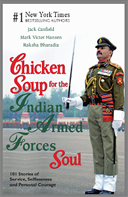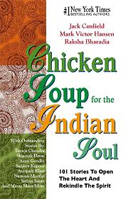Raksha Bharadia is the co-author of 12 titles in the Indian Chicken Soup for the Soul series including Chicken Soup for the Indian Soul, Teenage Soul and Romantic Soul. She has also authored ‘Me: A Handbook for Life’ and ‘Roots and Wings: A Handbook for Parents’ both published by Rupa. Her first novel, ‘All and Nothing’ was published in 2011. Raksha has also contributed many articles for Times of India, Femina and Gurlz.
How did the opportunity to work on the Chicken Soup for the Soul series come to you? What made you decide to take it up?
The publishing house Westland, which is doing the Chicken Soup for the Soul series in India, read my debut book, ‘Me : A Handbook for Life’ and they felt that I would be able to do a compilation of the Chicken Soup for the Soul edition. Even in my book ‘Me’, I dealt with real life situations where one found a way out from challenges by thinking differently, among other things. So the publishing house approached me with the offer.
I decided to take it up because I am always fascinated with human interest stories. What makes a person give up when another one does not? So Chicken Soup for the Soul was something that was exactly right up my alley. I like dealing with real life situations and people and those little, tiny victories which actually have a long term effect. So it was exactly my kind of work.
You have worked on 12 different chicken soup titles. What did the experience teach you personally? Do you believe it transformed you? In what ways?
There were many little things that happened. But there is one particular incident that stands out. I had a very close friend and we were going through a bad patch. This friend of mine and I had been thick friends for seven to eight years and because of one silly incident, we stopped talking to each other. We humans tend to get stuck to those little things that we will not let go. It was a matter of ego, a matter of ‘I am not going to do it’ and waiting to see who is going to make the first phone call. At that point of time, I remember one particular story that came to me as a submission for one of the Chicken Soup for the Soul titles. It was about this lady who had lost her mother. She had written that she had so many things to tell her mother but she will never be able to do it. After reading this story, I remember I started crying and I called up this friend of mine and we made up. So there definitely have been many, many instances like this when I was compiling the titles from the stories I received. The little things that I think are big in my life, the little inconveniences, the little grievances we have against people – I was able to see them in a broader light and I also realised that those are things that other people are struggling with as well.
Personally, I also came to a very big realisation through the Chicken Soup for the Soul series. While compiling these 12 titles (1200 stories), I must have gone through a total of 8000 to 10000 stories or roughly 500 to 600 stories per title to pick the ones that were finally featured. In reading the stories that came in, what I understood is that as people we may be different, but the issues, in the end, are fundamental to everyone and that we all behave in a typical manner – there is only a difference in the degree. This could be seen in the way humans react differently—the jealousy we experience, the grief we go through when someone close to us passes away or the way we take time to get over the hurt meted out by someone.
It may sound very simple when I say this but when I got my database of 10000 stories, it made me think that I am not alone in feeling what I feel. In a way Chicken Soup for the Soul stories are also stories of confession. So when you see people making confessions, you realise that we all have our grey areas and we also do a great job of hiding it. Also, I think it is not necessary to denounce every grey in your fibre. It is alright.
Which was the title that was closest to your heart? Why?
I love all of them but the title which I thought was very exciting and interesting was the Chicken Soup for the Indian Armed Forces Soul. To  get the initial permission from the Airforce, the Army and the Navy was a very lengthy process and when I got it, I was very happy about it. Then I stayed in Delhi and interviewed the personnel from the army and I got the stories up. That to me was an extremely interesting experience because I met a wide variety of people from commandos to engineers to co-pilots. It was so interesting to know a world that I didn’t have much exposure to, and also to get the emotional aspect – like for instance, getting answers to questions like when they were failing, how did they stretch themselves to do a little more, what was the attrition rate, how did the people fall out and so on. This title was a lot of fun to work on and also something that taught me many things.
get the initial permission from the Airforce, the Army and the Navy was a very lengthy process and when I got it, I was very happy about it. Then I stayed in Delhi and interviewed the personnel from the army and I got the stories up. That to me was an extremely interesting experience because I met a wide variety of people from commandos to engineers to co-pilots. It was so interesting to know a world that I didn’t have much exposure to, and also to get the emotional aspect – like for instance, getting answers to questions like when they were failing, how did they stretch themselves to do a little more, what was the attrition rate, how did the people fall out and so on. This title was a lot of fun to work on and also something that taught me many things.
I am sure a few stories from the ones you edited would have stuck to you. Could you tell us about one or two of them?
Among the many stories, here is one I remember. It was written by a girl and it was about how on her wedding day she got a letter from her grandma. The story was in the form of a letter, and talked about how the writer’s grandpa disappeared for a year from the grandma’s life and then came back. He was actually suffering from some terminal disease and the story talked about how he did everything he wanted to do in that one year. It was a very beautifully written letter of love, longing, and in which you will eventually appreciate how the grandma understood the need of her husband to do all the things he wanted to do because he wouldn’t be able to do them anymore. In the letter, the grandma had also written that this is how she expected the writer to look at her married life. I get goose-bumps when I think of it even now. There are many ways in which we know love, other than the passion aspect – love could be about giving, sacrificing and many more but here what I got is that love is also about understanding – when you truly understand the person you love, you will not judge that person. I think when you truly understand where the other person is coming from – it is very freeing in any relationship – whether it is a man-woman relationship or friendship or the relationship between a mother and a child. So I could make sense of this concept of understanding because of this story. It is also a beautiful story of how the grandpa did what he wanted to do and how he remembered his wife throughout.
 Another story which I remember is this very simple, cute little story – it was brought to me by an NGO which works on the rehabilitation of women on the streets who take up to alcoholism. This story was about one such lady and her kid. The NGO also happened to be taking care of the kid and one day, the writer of the story took the kid to the hospital to visit his mother. There was a beautiful part in this story. When the writer went to pick up the kid to take him to the hospital, he asked her many concerned questions about his mother, and also picked up fruits for her. But when he saw his mother, he realised that she was still drinking and being difficult and so he didn’t give her the fruits and came away. The writer realised that the son was showing his displeasure for what his mother did, in his own way. I was very touched by this story because we tend to think that these marginalised people, the people we see on the streets, may not have a normal mother-child relationship or a husband-wife relationship. But what the story pointed out to me was that emotions are very universal.
Another story which I remember is this very simple, cute little story – it was brought to me by an NGO which works on the rehabilitation of women on the streets who take up to alcoholism. This story was about one such lady and her kid. The NGO also happened to be taking care of the kid and one day, the writer of the story took the kid to the hospital to visit his mother. There was a beautiful part in this story. When the writer went to pick up the kid to take him to the hospital, he asked her many concerned questions about his mother, and also picked up fruits for her. But when he saw his mother, he realised that she was still drinking and being difficult and so he didn’t give her the fruits and came away. The writer realised that the son was showing his displeasure for what his mother did, in his own way. I was very touched by this story because we tend to think that these marginalised people, the people we see on the streets, may not have a normal mother-child relationship or a husband-wife relationship. But what the story pointed out to me was that emotions are very universal.
You do many workshops as well. I know that you do some on parenting. Are there any workshops that you have done specifically to motivate/inspire people?
I have been invited to talks where I have shared anecdotes that people have shared with me. They focus on unblocking the blocks. Apart from talks, I have also done workshops on this and that is something I find very interesting.
Lastly, a few words of inspiration for our readers?
I remember this interview I did with renowned filmmaker Mrinal Sen when I was working on my parenting book. At the end of the conversation, I asked him for two lines of inspiration for my readers. In reply, he told me, “Tell your readers that however sure you are of your talent in one field you cannot help but see your mediocrity in others.” All of us have this tendency to beat ourselves for everything we are not good at. I think while you may be exceptionally good in one field, it is extremely important to accept your mediocrity in others, both in yourself and in other people. The moment you accept this –accept mediocrity in your own self and allow mediocrity in others – you will find it to be a turning point in any relationship.
